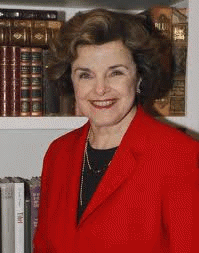by Walter Brasch
Sen.
Diane Feinstein and a horde of members of Congress of both parties want to
decide who is and who isn't a reporter. Sen. Feinstein says a "real" reporter
is a "salaried agent of a media company."
She mentions the usual suspects--New York Times, ABC News. She dismisses part-time staff. She
dismisses freelancers. She dismisses those who write, often without pay, for
the hundreds of alternative publications, and often break news and
investigative stories well ahead of the mainstream media. She dismisses anyone
who, she says, "have no professional qualifications."
The reason she wants to define what a reporter is or
isn't is because there's a proposed federal Media Shield Law that would protect
reporters from revealing their sources. Forty states and the District of
Columbia currently have shield laws. Sen. Feinstein wants to amend the federal
bill to take away existing First Amendment protections from anyone not involved
in--apparently--salaried establishment media.
There
are people who have minimal qualifications to be a reporter. Many write nothing
but screeds. Many have problems with basic language skills. Many have little
familiarity with the AP Style Book. Many have an inability to ask probing
questions of government officials; many merely transcribe what they're told,
whether from the president, a council member, or a local reader who is the
focus of a feature. Some of them are paid salaries and are agents of media
companies, which Sen. Feinstein believes are acceptable requirements.
There
are also those who frequently allow "deep background" and "off-the-record" comments.
Many news media won't allow sources to go "off-the-record." If the information
isn't available to the general public, it shouldn't be available only to
reporters. Access to news sources is something reporters enjoy that the average
reader doesn't; but there is a responsibility to the reader and viewer and
listener not to hide information.
There
are those who overuse the "veiled news source," which is a part of the Shield
Law. A veiled news source could be someone whom the reporter identifies as, "Sources
close to the Governor state . . ." Often, the reporter doesn't question a
source's motives for why she or he wants to give anonymous information, or if
it is merely a "trial balloon" to use the media to put out information; if the
people agree, sources become identified; if the public disagrees with a
proposal, no one traces the "leak" to politicians or their staffs.
On
more than a few occasions, reporters--whether "salaried agents" of a media
company, part-timers for that company or for any of thousands of alternative
publications or electronic media, or freelancers--have filled in holes in their
stories with false identities--"A 55-year-old housewife in Podunka, who asked
not to be identified, says . . . " Good reporters seldom use a veiled news source and then have to
protect them should there be a court order to divulge the source of
information.
On
rare occasions, however, a reporter, in consultation with an editor, will allow
a news source to be anonymous. Granting veiled news source status should not be
given unless a source's information and identity
puts her or him into significant personal jeopardy--and the information can be
verified.
But,
even if there are reporters who are lazy, who plagiarize, who abuse the veiled
news source privilege, there are no enforceable ethics rules in journalism. Reporters
aren't licensed--such as physicians, social workers, teachers, contractors, and
cosmetologists. Only an editor can discipline or terminate an employee.
Nevertheless, whenever the government says it wants to
define what a reporter is or is not--and the public, outraged over something a
reporter or news operation did or did not do demands licensing and enforceable
codes of ethics--a huge red flag should be in everyone's face. Not one part of
the First Amendment determines who or what a reporter is, or what is or is not
news. The Founding Fathers didn't forget to include that; they deliberately
didn't want to include that. They believed government shouldn't be making those
decisions, and the news media, even the media that base their news upon lies
and scandal, must be independent.
And,
yet, government and the news media often wink at the intent of the Founding
Fathers and cozy up together.
The
only thing more outrageous than reporters and sources playing golf or tennis
together is reporters schmoozing at political receptions, the women dressed
like they were movie celebrities on the Red Carpet, the men in tuxedos. And the
reason why they go to these receptions? They claim it's because they "get their
information" there.
(Note: You can view every article as one long page if you sign up as an Advocate Member, or higher).





